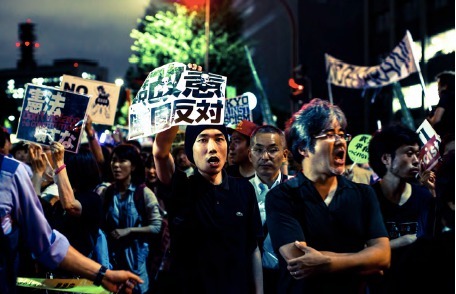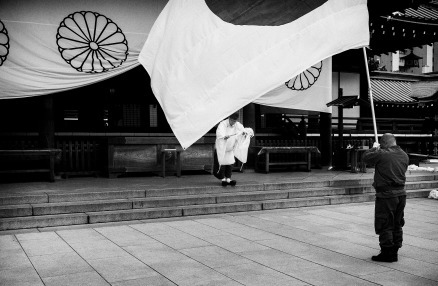
Why should our nastiness be the baggage of the an apish past and our kindness uniquely human? Why should we not seek continuity with other animals for our ‘noble traits’ as well?
—Stephen Jay Gould
Multiple Perspectives
Since the inauguration of the second Abe Cabinet, the Japanese leadership has begun voicing its dissatisfaction with being endlessly blamed for wartime atrocities. In recent parliamentary debates, members of the LDP are openly voicing their discontentment. “How many apologies does it take to satisfy the victims of the Second World War?” Nationalist historians who deny the full extent of the Nanjing Massacre and the coercion of “comfort women” are also appearing more frequently in the Japanese media. Some Diet members are arguing that Japanese remilitarization is justified as protection against a possible attack by neighboring countries.

After nearly seven decades, why are these issues re- surfacing? The answer depends on one’s nationality, age group and political persuasion. For most Chinese statesmen, the Allied war settlement was unsatisfactory both from financial and moral standpoints. Both Chinese and Korean scholars agree that at various times in its history Japan has tried to occupy the East Asian continent and caused untold suffering in pursuit of that goal without providing adequate restitution. For example, after the Sino-Japanese War in 1895, the Qing court was forced to pay 200 million taels of silver as war reparations and to give up Taiwan, the Penghu Islands and the Liaodong Peninsula to Japan. This settlement, known as the Treaty of Shimonoseki, devastated China’s economy and slowed down its industrialization for decades, facilitating the Japanese colonization of Korea in 1910 and invasion into China during the 1930s and 40s.
Korean scholars argue that since ancient times the Japanese elite have harbored plans to conquer Korea. In fact, since the 1940s some Japanese scholars have claimed that there was a Japanese colony called Mimana that was occupied between the 3rd to 6th centuries. Although Korean scholars refute such claims as Japanese propaganda, they emphasize that Japanese pirates and warlords repeatedly invaded the Korean coastline for centuries until the warlord Toyotomi Hideyoshi launched a full-scale invasion in 1592. With Chinese military assistance, the Sino-Korean alliance managed to push back the Japanese warlords, but three centuries later, once again the Japanese army invaded, forcing the Korean Emperor Gojong to abdicate and annexing the peninsula in 1910. The Japanese occupation during the Pacific War continues to stir up enmity because Korean nationals were forced to work in Japanese mines and factories under life-threatening conditions.
For decades historians have debated why the rest of Asia could not have foreseen Japanese military expansion, based on numerous historical precedents. Eri Hotta in her 1941: Countdown to Infamy, convincingly documents the negotiations between Japan and the Allied powers that ultimately failed because a few top Japanese militarists were determined to fight a war that could not be won. This groundbreaking work serves as a cautionary tale, not only for diplomats and heads of state, but for anyone who sufferers from racial prejudice and blind nationalism.
Unfinished Postwar Settlement
The postwar settlement, highly unpalatable to one side, is one of the main reasons why animosity lingers on between Japan and its neighbors. Japanese scholars argue that the International Military Tribunal for the Far East was a manifestation of victor’s justice, while Chinese and Korean statesmen feel that too few Japanese war criminals were punished. In many cases the Allied judges had difficulty proving their cases because, after its surrender, the Japanese army carried out a massive campaign of document burning. Historians agree that the most damaging records exposing the brutal military orders vanished in soot above smokestacks throughout Tokyo and in major cities such as Shanghai, where the inconvenient past was systematically wiped out. This calculated effort made it difficult for the occupation authorities to effectively carry out their postwar program for full disclosure in Japan.

By contrast, German citizens in the occupied Western zones had to make obligatory visits to concentration camps, and if they refused to watch documentary films that exposed the full extent of Nazi war atrocities, sometimes their food stamps were even withheld. There were citizens who did refuse to cooperate with these programs, and not surprisingly, criticism against local denazification trials existed, but in the decades to come German authorities revealed a far greater awareness of their war crimes than their Japanese counterparts.
Why is there such disparity in these nation’s efforts to cover up their wartime atrocities? Despite the male predisposition toward group aggression, recent findings have shown that non-human primates engage in post-conflict reunions with former opponents. Although memories of war atrocities can be handed down for generations, symbolic acts that express sincere regret can lead to genuine reconciliation. In 1970 when the West German Chancellor Willy Brandt visited the monument dedicated to the Warsaw Ghetto Uprising (1943), he was overcome with such shame and sadness that he spontaneously knelt down on his knees. His silent act demonstrated how genuine repentance can be expressed without words. Language, on the contrary, sometimes fails to convey the overwhelming sense of regret. What most Chinese and Korean victims want is not simply words, but a contrite national awareness of the immeasurable suffering the Japanese military caused Asians during the first half of the twentieth century.
It is unclear whether the present LDP leadership is misinformed or deliberately refusing to recognize the horrors of Japanese colonialism while disseminating false historical accounts. With the exception of the LDP and the Japan Restoration Party, most Japanese politicians are beginning to recognize that Prime Minister Abe’s symbolic acts of defiance since his second inauguration have heightened tensions in East Asia. The prime minister’s strategically timed visit to Yasukuni Shrine on Dec. 26, 2013 coincided with the 120th anniversary of Mao’s birthday, causing an uproar in China. Relations with Japan had already been strained by the prime minister’s callous comments about “comfort women,” but his posing for photographers, smiling with a thumbs-up gesture in a cockpit of a jet-plane emblazened with the number 731 was insensitive and cruel. Given its preoccupation with etiquette and details, the Japanese Defense Ministry could not have failed to recognize that the number 731 evokes memories of Unit 731, a covert Japanese biological and chemical research facility in Harbin, where lethal experiments were performed on an estimated 30,000 prisoners of war and civilians. Trivializing these human experiments not only enrages the Chinese who live in Harbin but is also unthinkably disrespectful toward victims from numerous other nations who lost their lives through such inhumane acts.
It is quite distressing that the younger generation of Japanese remains largely ignorant of the gruesome history of Unit 731 or of the Japanese army’s implementation of the “Three Alls Policy” (kill all, burn all, loot all) which made a no-man’s land of certain areas in North China during the war. According to Pulitzer Prize-winning Herbert P. Bix, the campaign even exceeded the Rape of Nanjing in its scale and brutality, but these atrocities are hardly publicized in Japanese —not to mention being taboo in school textbooks. On June 29th, an unidentified man climbed on top of a bridge near Shinjuku station and took up his megaphone to criticize Abe’s attempts to remilitarize Japan. Few pedestrians paid attention to his passion- ate speech, which lasted about an hour, until the man suddenly set fire to himself and was carried away in an ambulance. Ritual suicide in the name of the Emperor was not uncommon during the 1940s, but self-immolation as an act of social protest is unprecedented in postwar Japan. The incident was immediately reported throughout the world, but NHK refused to comment on this politically-motivated act until numerous social networks began attacking the Japanese national media for its callousness.
The 10,000 or so protesters who gathered outside the prime minister’s office on July 1st were similarly downplayed by the pro-LDP broadcasting network. Ever since the prime minister appointed Katsuto Mommii as the president of NHK, critics on all sides have detected unmistakable suppression of criticism of the current Japanese administration. While the foreign press continues to bring
up the destabilizing affect of bypassing the constitution, NHK focused on the World Cup and petty squabbles within the Japanese Diet. In fact, Article 9 itself has been nominated for the Nobel Peace Prize in April 2014 in response to Abe’s efforts towards militarization. Whether or not Abe’s reinterpretation of article 9 will lead to military maneuvers is yet to be seen, but he has certainly created loopholes for war-hawks that could be conveniently exploited.
As Alan Weisman has shown in The World Without Us, sometimes imagining worst-case scenarios can help both leaders and citizens shift to a more moderate stance. If a Chinese aircraft were to be shot down by Japanese Self-Defense Forces over the Senkaku/Diaoyu Islands, as the Abe regime has threatened, the United States would be unlikely to support the Japanese in further military maneuvers. Just one day after the Japanese Self-Defense Ministry alluded to potential military action, the Chinese government warned these officials that there would be “serious consequences” for shooting down any Chinese plane flying over the disputed territory. Wars have been triggered by such incidents in the not so distant past. If such skirmishes should escalate into full-scale war, the Chinese and Koreans would be likely to fight the Japanese with a ferocity not anticipated here. With the reinterpretation of Article 9, the Abe administration has assured the public of its self-defense capabilities, but a country with nuclear power plants dotting its coastline might suffer an apocalyptic disaster should the conflict escalate into a war of vengeance. One does not have to be a historian to know that once popular resentment has been unleashed, even the heads of state can lose control over their military.
Reconciliation
On the other hand, if one adopts a macroscopic perspective, in ancient times there were periods when relative peace and stability were maintained in East Asia for centuries. Korean envoys who visited the Chinese capitals between the Sui and Tang dynasties enjoyed favorable reputations at court, and Japanese Buddhist monks who studied in Chang’an and Luoyang were praised for their erudition and humility. The compilers of the earliest Japanese legal codes known as the Ritsuryo wrote commentaries that indicate the greatest respect for Chinese philosophy and its judicial system. In the realm of art, the Buddhist monk Sesshu Toyo (1420-1506), served as a kind of cultural ambassador between Japan and China when relations were strained by Japanese piracy. As a talented landscape painter, Sesshu traveled to China where his talent was immediately recognized by the most prominent circles. After returning to Japan, Sesshu blended Song dynasty models with Japanese aesthetic sensibilities. The mystical mountains that he painted towards the end of his life are seen as a symbol of transcendence.

The last decade has not exactly been the golden age of East Asian diplomacy, but the prospects are not as grim as the war-hawks project. In fact, there is now evidence of a growing domestic opposition to Japanese remilitarization. In February, Japan’s former prime minister Murayama Tomiichi traveled to Seoul to make a formal apology in front of the South Korean National Assembly and to meet with former “comfort women.” While reiterating his regret for the “indescribable sufferings” his country had brought about, Murayama stated that the Abe regime is obligated to recognize the responsibility of the Japanese government toward the victims of its wartime aggression. Although Murayama’s visit received criticism in Japan, it sent a clear message that there are Japanese politicians within the highest circles who are censuring the Abe’s regime’s revisionist views of the war. In addition, Murayama proposed that tensions in the Senkaku/Diaoyu Islands could be reduced by joint ownership between China, Japan and Taiwan.
Though the majority of Diet members dismiss such proposals as unrealistic, even the imperial family, who usually refrain from opposing the LDP, have shown their support for peace, especially in regards to Article 9. On February 23, Prince Akihito, first in the line to the throne, emphasized the crucial role of the pacifist constitution on his 54th birthday. “Today’s Japan was built with the Japanese Constitution as the cornerstone, and our country is now enjoying peace and prosperity.” Although no reference was made to the present regime, the future emperor made it clear that he has no intention of supporting remilitarization.
Empowering domestic opposition to potentially dangerous political revisionism may ultimately require reforming a political system in which the voters have no direct voice in the choice of their leaders. After all, one of the important tests of any political system is to consider whether the leadership represents the people. If Japan is indeed a country that values harmony and aesthetic refinement, do the present-day politicians really represent the popular will? Surely there are plenty of more qualified candidates than sons and grandsons of gangsters and Class A war criminals. Opposition parties in the Diet are beginning to formulate plans for an electoral system that will fairly represent the people’s choice.
In fact, diplomats and scholars have spent decades exploring concrete steps that could facilitate reconciliation. For example, the Bank of Japan still holds an estimated 278 million yen worth of unpaid assets from the early 1940s earmarked for East Asian victims of Japanese forced labor. In fact, the Japanese Home Ministry itself had stipulated that Koreans and Chinese who were forced to work in Japan should receive payment, but after the war American authorities stalled on disbursing these funds. Although many of these victims have now passed away, restitution of these assets to their relatives could be made as part of a gesture toward reconciliation.
Equally deserving of recognition and amends for their immense and lingering suffering, both physical and psychological, are the Asian women forced into servitude as “comfort women” by the Japanese military. Until now the Japanese government obfuscates its responsibility behind the San Francisco Peace Treaty of 1951 and subsequent bilateral treaties to claim that all war-related reparations to “comfort women” have been resolved. Although sympathetic Japanese citizen groups have privately set up funds to distribute compensation to former “comfort women,” most victims have refused them, insisting that such funds should come directly from the government along with a sincere apology. As President Park has continually emphasized, this is one of the crucial steps that the Japanese government needs to take to resolve animosity and restore harmony to the region.
The German Fund for the Future, formally known as “Remembrance, Responsibility and Future,” was established in 2000. It allotted 5.2 billion Euros to those who were forced by the Nazis to undergo similar harsh labor programs. The German government took the initiative by forming joint projects with companies that used forced labor during the war to compensate 1.6 million victims in almost 100 countries. Many scholars of Asian history agree that the Japanese government should seriously consider following the German model before all the survivors pass away. Contrary to what some Japanese politicians believe, postwar resentment is not likely to fade away unless a radical shift in governmental policy takes place.
One of the best ways to cultivate mutual understanding is to read books on 20th century history — not nationalistic historiography but works that help one understand why war atrocities occurred. For political reasons, works that describe the Japanese treatment of POWs such as Unbroken: A World War II Story of Survival, Resilience, and Redemption and the latest theories on warfare such as Sex and War: How Biology Explains Warfare and Terrorism and Offers a Path to a Safer World are not translated or reviewed in Japanese. Though there is limited availability, reading accounts about the war written by non-Japanese authors will certainly give a more balanced perspective to readers who are open-minded.
On a more popular level, Japanese animators and film directors have recently praised the ingenuity of the Zero airplane’s design and the bravery and pathos of the kamikaze pilots. These directors have been openly criticized by the Chinese and Korean media. Nevertheless, if Japanese film directors could produce films that express deep regret and sympathy for the victims of the Japanese military aggression, they could win the international community’s support and gratitude. Such artists might be criticized by the conservative branch of the media but their impact on popular consciousness would be significant, as German directors who produced films that condemn the Nazi regime have demonstrated.
I would like to conclude with an ancient historical precedent, one worthy of consideration as it illustrates popular sovereignty and far-sighted vigilance. The ancient Athenian democracy relied on a procedure known as “ostracism” enabling citizens to banish any individual who was considered a threat to the peace and security of the state. This early form of democracy has not survived into modern times, and so jingoist leaders willing to risk dragging their countries into war can still cling to power. Regardless of one’s race or nationality, people need to recognize the dangers of blind acquiescence and try to create a vocal opposition before such leaders highjack and alter the apparatus of the state. The peace process should not be left to diplomats and academics alone. It ought to be a soul-searching process of dialogue and forgiveness involving all levels of society.

Jonathan Augustine is the founder of the theatrical company Cactus Brothers (劇団サホテン)based in Kyoto. Since the 1970s, he has spent most of his life in Asia, where he is active in various volunteer projects.
His academic and fictional works include Shadows of the Atomic Bomb『原爆の影』(2013), Karakuchi Onna『辛口女』 (2010), Land of the Immortals『 仙人之谷』(2005) and Buddhist Hagiography in Early Japan (2005).